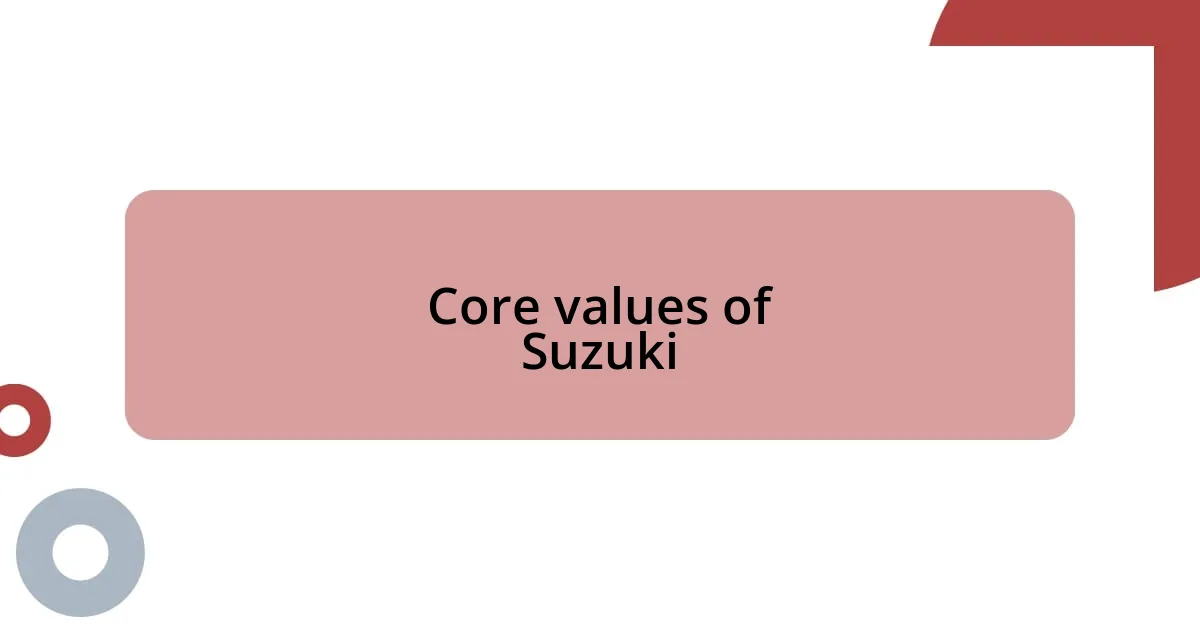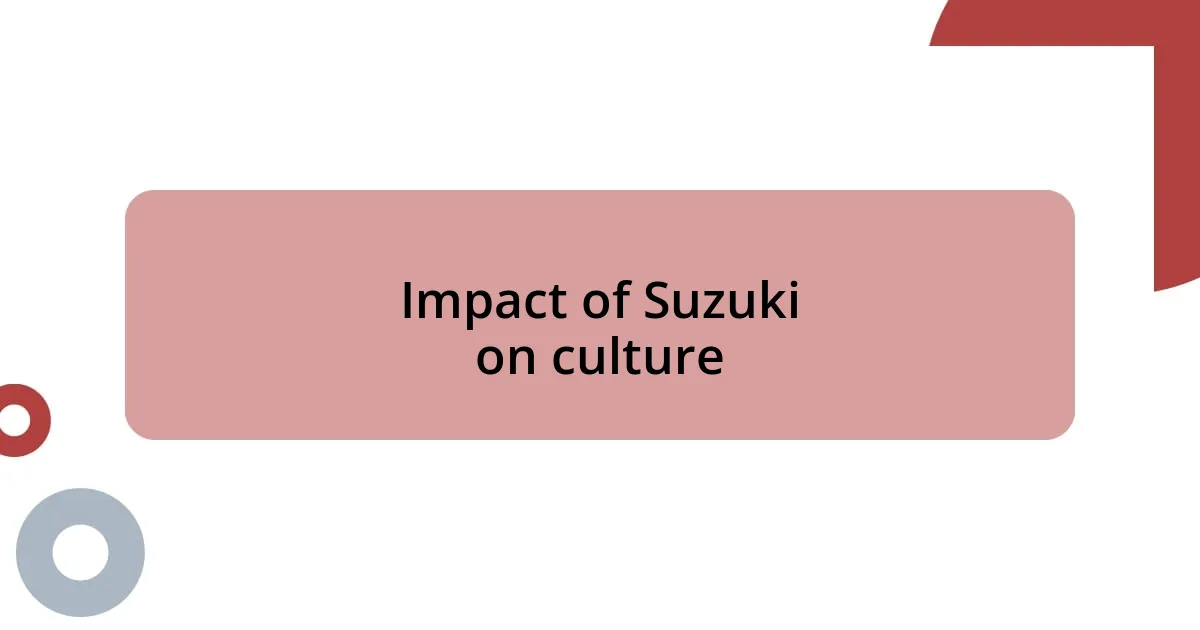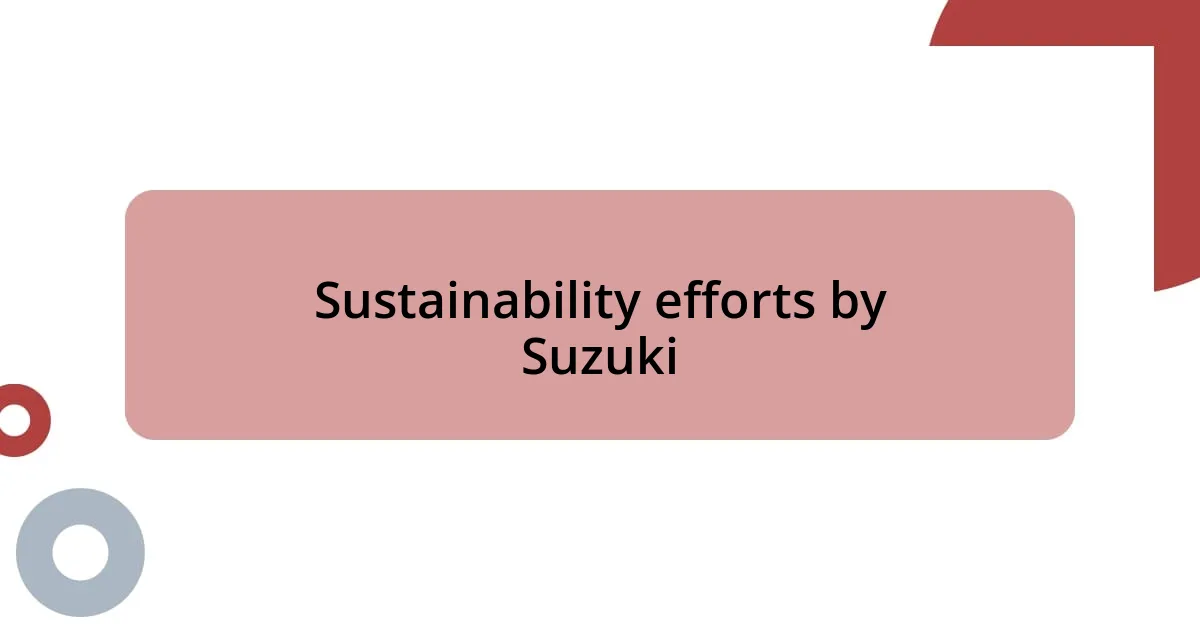Key takeaways:
- Suzuki transitioned from loom manufacturing to automobiles in 1909, exemplifying adaptability and innovation.
- Introduced in the 1950s, the Power Free motorcycle was pivotal in establishing Suzuki’s influence in the Japanese motorcycle market.
- Suzuki’s core values focus on innovation, quality, sustainability, customer focus, and embracing diversity, guiding its global success.
- Global market presence strengthened through local partnerships, tailored products, and a commitment to community engagement and sustainability.

Suzuki’s brand history
Suzuki’s journey began in 1909 when Michio Suzuki founded the Suzuki Loom Manufacturing Company in Hamamatsu, Japan. Initially, they focused on weaving machines, which might make you wonder: what led them to pivot towards automobiles? I often think about the vision it took to shift from looms to engines—it’s a testament to Suzuki’s ability to embrace change and innovate.
By the 1950s, Suzuki took a bold step into the motorcycle market, launching the iconic Power Free, a light bike that quickly gained popularity. This moment was pivotal not just for the brand but for the entire motorcycle industry in Japan. I remember the thrill I felt when I first rode a motorcycle, appreciating how Suzuki’s commitment to quality and performance has echoed in the biking community over the decades.
As the company evolved, they introduced the Suzuki Alto in the 1970s, marking the brand’s entry into the compact car segment. Have you ever experienced the joy of driving a small car through a bustling city? I have, and I often reflect on how Suzuki successfully crafted vehicles that combine practicality with efficiency—truly reflecting the spirit of its origins while pushing the boundaries of automotive design.

Core values of Suzuki
Suzuki’s core values are deeply rooted in innovation, quality, and customer satisfaction. I find it remarkable how these principles have guided the company through decades of change. Each vehicle Suzuki creates seems to embody not just functionality, but an understanding of the diverse needs of drivers around the world. It reminds me of the first time I felt the smooth handling of a Suzuki on a winding road; that attention to detail translates into real-world driving experiences.
Here are some core values that define Suzuki:
- Innovation: Pioneering new technologies to enhance performance and efficiency.
- Quality: Commitment to build vehicles that endure time and use, ensuring reliability.
- Sustainability: Striving to reduce environmental impact through eco-friendly practices.
- Customer Focus: Listening to feedback and evolving products to meet expectations.
- Diversity: Embracing a global perspective while catering to local markets.
Each value contributes to a holistic approach, making Suzuki not just a car manufacturer, but a brand that resonates with people’s aspirations. I can’t help but feel a connection to their journey, having witnessed the evolution of their vehicles over the years. It creates a sense of loyalty knowing their foundational beliefs still align with their products today.

Global market presence of Suzuki
Suzuki’s global market presence has expanded impressively since its automotive inception. I recall attending an international auto show where the Suzuki booth showcased models tailored for diverse markets, from compact city cars in Europe to rugged SUVs favored in markets like India. This adaptability is a key factor in their ongoing relevance and success worldwide.
What strikes me most is Suzuki’s ability to forge partnerships that enhance its footprint across continents. For example, their collaboration with local manufacturers in emerging markets has resonated deeply with consumers. I remember reading stories from friends who bought Suzuki vehicles, sharing their pride in owning a car that feels tailored to their needs while being affordable—a testament to Suzuki’s understanding of local preferences.
Their wide array of models has managed to attract a loyal customer base globally, which is evident in their sales figures. The excitement of witnessing a Suzuki on the streets of different countries is something I cherish; it reinforces my belief that Suzuki has successfully turned its vision into a global brand.
| Region | Market Presence |
|---|---|
| Asia | Leading compact car and motorcycle manufacturer, strong in India and Japan. |
| Europe | Popular small cars like the Suzuki Swift serve urban drivers well. |
| North America | Focus on SUVs; strong brand recognition despite fewer models available. |
| South America | Market penetration through compact vehicles and local partnerships. |

Impact of Suzuki on culture
Suzuki’s influence on culture extends far beyond mere transportation. I still remember how, during my college years, a friend introduced me to the Suzuki Swift. It wasn’t just a car; it represented a shift toward compact, efficient living. Suddenly, navigating tight urban spaces felt liberating rather than constricted. This car became a cultural icon among my peers, symbolizing freedom and adventure. Isn’t it fascinating how a vehicle can embody the spirit of its time?
In various countries, Suzuki has woven itself into the fabric of daily life. I once visited a rural community in India where Suzuki motorbikes were the lifeline for many families, connecting them to marketplaces and schooling. That sight struck me deeply; these bikes weren’t just means of transport; they were a bridge to opportunities and aspirations. The pride people took in owning a Suzuki motorcycle resonated within those vibrant communities, highlighting how the brand fosters connections and empowers individuals.
Moreover, Suzuki’s emphasis on sustainability has sparked a cultural conversation about responsible driving. I recall a lively discussion among friends about the importance of eco-friendly vehicles, and how Suzuki’s hybrid models fit perfectly into that narrative. It was empowering to see our choices reflecting a commitment to the planet, influencing how we think about mobility. Isn’t it amazing how a car company can inspire us to engage more thoughtfully with our environment?

Sustainability efforts by Suzuki
Suzuki has been making significant strides in sustainability that genuinely resonate with my values. I remember the first time I learned about their commitment to reducing CO2 emissions; it felt refreshing to see a major car manufacturer taking such responsibility. Their initiatives, like developing eco-friendly vehicles and investing in hybrid technologies, showcase a sincere effort to lessen their environmental footprint. Isn’t it reassuring to know that companies like Suzuki are prioritizing our planet?
What really caught my attention was Suzuki’s approach to manufacturing. I once visited a facility where they utilized renewable energy sources, such as solar power, which made me appreciate their holistic view of sustainability. Their commitment to minimizing waste through efficient production processes isn’t just a buzzword—it’s a genuine practice that aligns with our collective responsibility towards the environment. This kind of innovation excites me; it sparks hope for the future of the automotive industry.
Moreover, Suzuki’s emphasis on promoting eco-driving practices is commendable. I recall a local event where they showcased tips for fuel-efficient driving. Engaging with the community, they emphasized how simple changes could save fuel and reduce emissions. It struck me that sustainability isn’t just about creating greener vehicles; it’s also about empowering drivers with knowledge. How powerful is that realization? It’s a reminder that we all play a role in shaping a sustainable future.

Suzuki’s community engagement initiatives
Suzuki’s community engagement initiatives genuinely reflect its commitment to social responsibility, which resonates deeply with me. I recall attending a local event where Suzuki partnered with a nonprofit to provide vocational training for underprivileged youth. It was inspiring to see how these initiatives were not just about promoting products; they were about creating pathways for young people to gain skills and opportunities. Watching the participants light up as they learned about automotive technology was a beautiful reminder of how corporations can contribute to the community’s growth.
Additionally, I had the chance to participate in a tree-planting campaign organized by Suzuki. While digging in the soil, I felt an emotional connection to the earth and a profound appreciation for the company’s emphasis on sustainable practices within the communities they serve. This kind of engagement goes beyond the boardroom—it’s about fostering a sense of togetherness and accountability. To think that one company can spark a wave of environmental awareness within a community is utterly exhilarating, don’t you think?
Moreover, Suzuki’s support for local arts and cultural events has always impressed me. I remember attending a festival last summer where Suzuki sponsored local artists to showcase their work. The vibrant expressions of creativity complemented by Suzuki’s presence highlighted how the company values cultural enrichment. It’s powerful to see a brand that not only supports its products but also nurtures creativity. Isn’t it wonderful when businesses understand their role in enriching community culture?

Lessons from Suzuki’s global strategy
One key lesson from Suzuki’s global strategy is the significance of adaptability. I remember discussing with colleagues how Suzuki tailored its products to fit diverse markets, especially in developing countries. By understanding local needs, such as the popularity of small, fuel-efficient cars in India, they’ve successfully established a strong foothold. Isn’t it fascinating how a company can thrive by simply paying attention to what different communities desire?
Another important takeaway is the power of collaboration. I’ve seen Suzuki engage with local partners to strengthen their supply chain and enhance innovation. For instance, they’ve worked with tech companies to integrate advanced safety features into their vehicles. This collaborative spirit not only fosters innovation but also builds trust with consumers, showing that they value contributions from various stakeholders. Could this be a model for other companies aiming for global presence?
Lastly, I admire Suzuki’s commitment to long-term vision over short-term gains. I recall a conversation with a friend who noted how Suzuki invests heavily in R&D for sustainable technologies, even when immediate financial returns aren’t guaranteed. This strategic foresight allows them to be pioneers in the market and cultivates a reputation of reliability among eco-conscious consumers. Isn’t it refreshing to see a brand committed to the long game?












